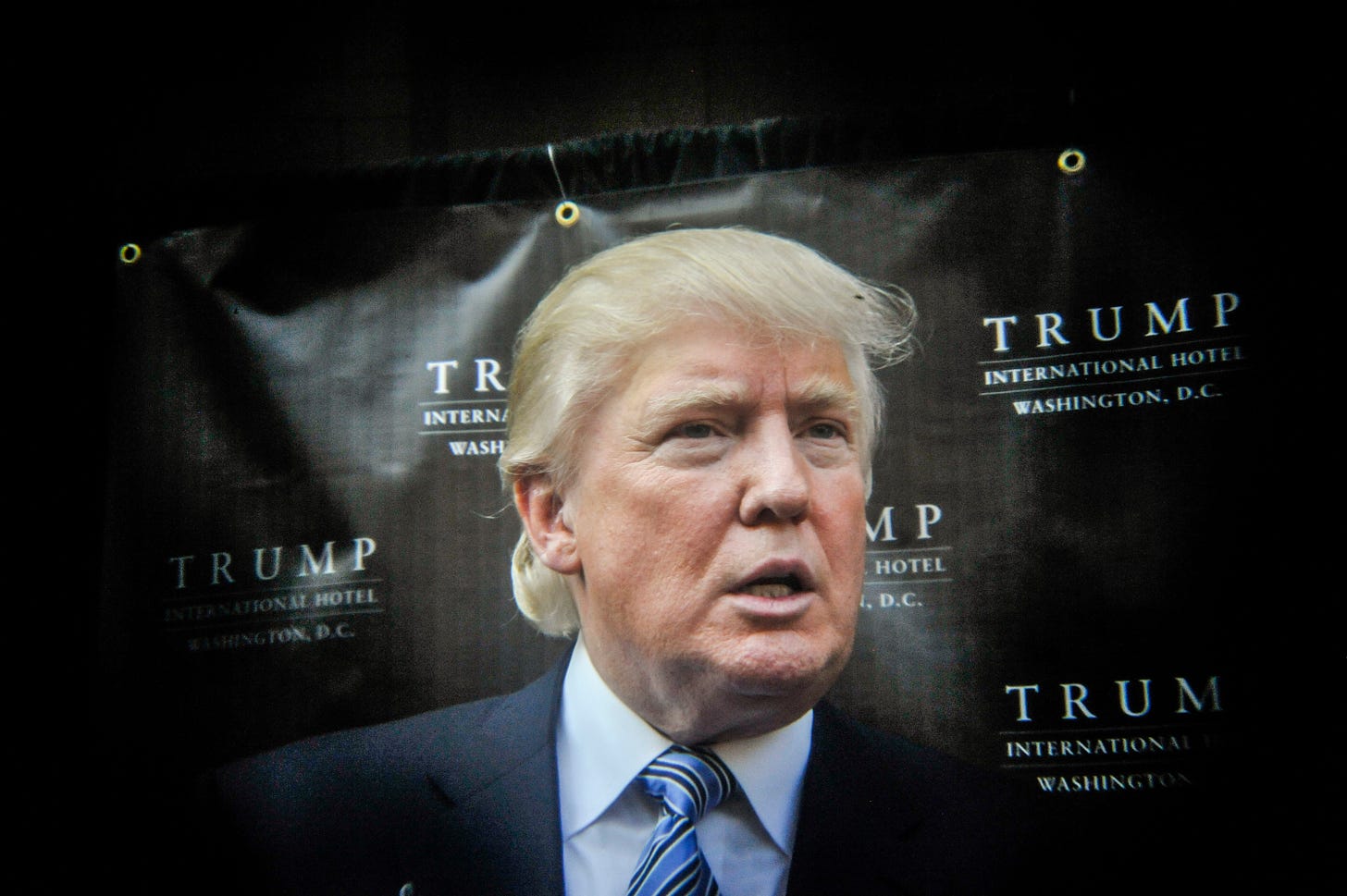Trump and the Abuse of the Pardon Power
The Framers didn’t envision a president doing with it what we know Trump did in his first term. Now imagine a second.
THE FRAMERS OF AMERICA’S CONSTITUTION got many things right; the structure they built has now endured well into its third century. But one provision in the sacred document that has lately proved profoundly problematic can be found in Article II, section 2, clause 1 which provides that “The President . . . shall have Power to grant Reprieves and Pardons for Offences against the United States, except in Cases of impeachment.”
The pardon power has deep roots in British law, with a precedent at least as far back as the statutory rolls of the Anglo-Saxon monarchs in the seventh and eighth centuries. The law provided that “If any one fight in the king’s house, let him be liable in all his property, and be it in the king’s doom whether he shall or shall not have life.”
Fast forward ten and a half centuries. In Federalist 74, Alexander Hamilton defended the incorporation of a pardon power in the American Constitution in the name of mercy and grace. “The criminal code of every country partakes so much of necessary severity,” Hamilton wrote, “that without an easy access to exceptions in favor of unfortunate guilt, justice would wear a countenance too sanguinary and cruel.”
As for the scope of the power, the Framers believed it should be exceptionally broad. As Hamilton put it, “Humanity and good policy conspire to dictate, that the benign prerogative of pardoning should be as little as possible fettered or embarrassed.”
As little as possible fettered or embarrassed. The pardon power granted to the president by the Constitution is nearly absolute. And that, at present, is the root of considerable political trouble. In the hands of an unscrupulous demagogue, the pardon power may be deployed to inflict grievous injury on our liberal democracy.
Already as president, Donald Trump was promising to use the pardon power in unprecedented fashion. In August 2019, according to the Washington Post, he told aides that he wanted to accelerate construction of his border wall, and they should feel free to break laws to that end as he would pardon them for any trespasses they committed along the way. No one in Trump’s orbit seems to have taken the risk (and Trump, predictably, called the Post report “fake news”), but it did not seem out of character—and was hardly the end of Trump’s abuse of the pardon power.
To keep the Mueller investigation at bay, Trump, communicating directly or through intermediaries, repeatedly dangled pardons in front of underlings to keep them from cooperating or testifying truthfully. Thus, as the Mueller report records, after Michael Flynn began cooperating with the government, “the President’s personal attorney counsel left a message for Flynn’s attorneys reminding them of the President’s warm feelings towards Flynn, which he said ‘still remains,’ and asking for a ‘heads up’ if Flynn knew ‘information that implicates the President.’” Responding to a press inquiry about whether he was considering a pardon for Flynn, Trump said “I don’t want to talk about pardons for Michael Flynn yet. We’ll see what happens. Let’s see. I can say this: When you look at what’s gone on with the FBI and with the Justice Department, people are very, very angry.”
During the prosecution of Paul Manafort, Trump’s 2016 campaign chairman, the Mueller report records that even while the jury in his criminal trial was deliberating, “the President praised Manafort in public, said that Manafort was being treated unfairly, and declined to rule out a pardon.” Then, after Manafort was convicted, “the President called Manafort ‘a brave man’ for refusing to ‘break’ and said that ‘flipping’ ‘almost ought to be outlawed.’” The Mueller report concludes that “The President and his personal counsel made repeated statements suggesting that a pardon was a possibility for Manafort, while also making it clear that the President did not want Manafort to ‘flip’ and cooperate with the government.”
After Trump associate Roger Stone publicly announced that he would not cooperate with prosecutors, the President, according to the Mueller report, “called Stone ‘very brave’ and said he had ‘guts!’ for not ‘testify[ing] against Trump.’”
Rudy Giuliani, serving as one of Trump’s personal lawyers, was enlisted to drop hints to the various defendants. In one interview, he told the New York Daily News that “when the whole thing is over, things might get cleaned up with some presidential pardons.” (This month, in a disturbing new wrinkle, Giuliani was accused by an aide of selling or attempting to sell presidential pardons for $2 million a pop.)
In the end, and with so much soothing music played before his ears, Manafort did not “break” or “flip.” Neither did Flynn or Stone. Manafort was sentenced to seven and a half years in prison, Stone was sentenced to more than three years, and the Department of Justice sought a six-month spell for Flynn. In late 2020, as his presidential term was drawing to an end, Trump pardoned all three of these convicted Russia-collusion confederates. Of the three, only Manafort spent any time incarcerated for his crimes.
THE MAN WHO ABUSED the pardon power in this brazen way is now once again the frontrunner in the Republican primary contest for the presidency. Given President Joe Biden’s age, given the fact that in 2020 Trump missed tying Biden in the Electoral College by a mere 45,000 votes, and given the fact that Trump actually succeeded in winning the presidency in 2016, there is an all too real possibility that he will be returned to the White House in 2024.
During this month’s CNN town hall, Trump said that if re-elected he would be “inclined to pardon many” people convicted for their involvement in the January 6th attack on the U.S. Capitol. Of course, one cannot know in advance, but this well might include those convicted of sedition—members of the Proud Boys and the Oath Keepers—like Oath Keeper leader Elmer Stewart Rhodes, sentenced last week to serve 18 years in prison. If Trump were to pardon Rhodes and his coconspirators, along with many of the other roughly one thousand January 6th defendants, Trump will be in a position to forge what amounts to a personal militia, whose members, grateful and loyal to him, will have license to work his will outside of the law, secure in the knowledge that they will be pardoned, including for felonies as serious as sedition.
Ranking officials in a Trump administration might also feel free to violate the law to serve their master, as Trump reportedly suggested they do with respect to his border wall. To be sure, none of this is a certainty. But we have seen enough to know that it is not far-fetched. Trump, after all, has already abused the pardon power to commit the crime of obstruction of justice, for which he remains unpunished. See Manafort, Flynn, and Stone above.
We have had many controversies about pardons across our history, the most famous of which is President Ford’s of his predecessor Richard Nixon for the crimes committed in Watergate. Jimmy Carter provoked a storm with his blanket pardon of Vietnam war draft evaders. George H.W. Bush got into hot water—or at least a heated controversy—for pardoning a raft of officials involved in the Iran-Contra affair. Bill Clinton came under investigation for his pardon of fugitive Marc Rich, whose ex-wife, a major Democratic donor, had contributed $450,000 dollars to the Clinton presidential library. Barack Obama came under withering criticism for commuting the sentence of mega-leaker Chelsea Manning.
But all of this is Lilliputian next to what Donald Trump has done and threatens to do again on an even greater scale.
The only check on abuse of the supposedly “benign prerogative” of the pardon power is impeachment. It is the single remedy that the Constitution offers. Unfortunately, we have already traversed that road twice in the Trump years and seen how it ends. Republicans in the House and the Senate are almost uniformly terrified of losing the support of the MAGA base and will never vote to impeach or convict its orange hero. We are thus faced with the prospect of a breakdown of the rule of law and the rise of hitherto unthinkable impunity.
What can be done to ward off this possibility? Amending the Constitution to limit the pardon power would take years and require a national consensus. Congressional legislation to curtail the pardon power is equally impossible: The Supreme Court has ruled that the pardon power “cannot be modified, abridged, or diminished by the Congress.” There is only one all-important remedy in our hands, and it is not a sure thing: crush Donald Trump at the polls.






